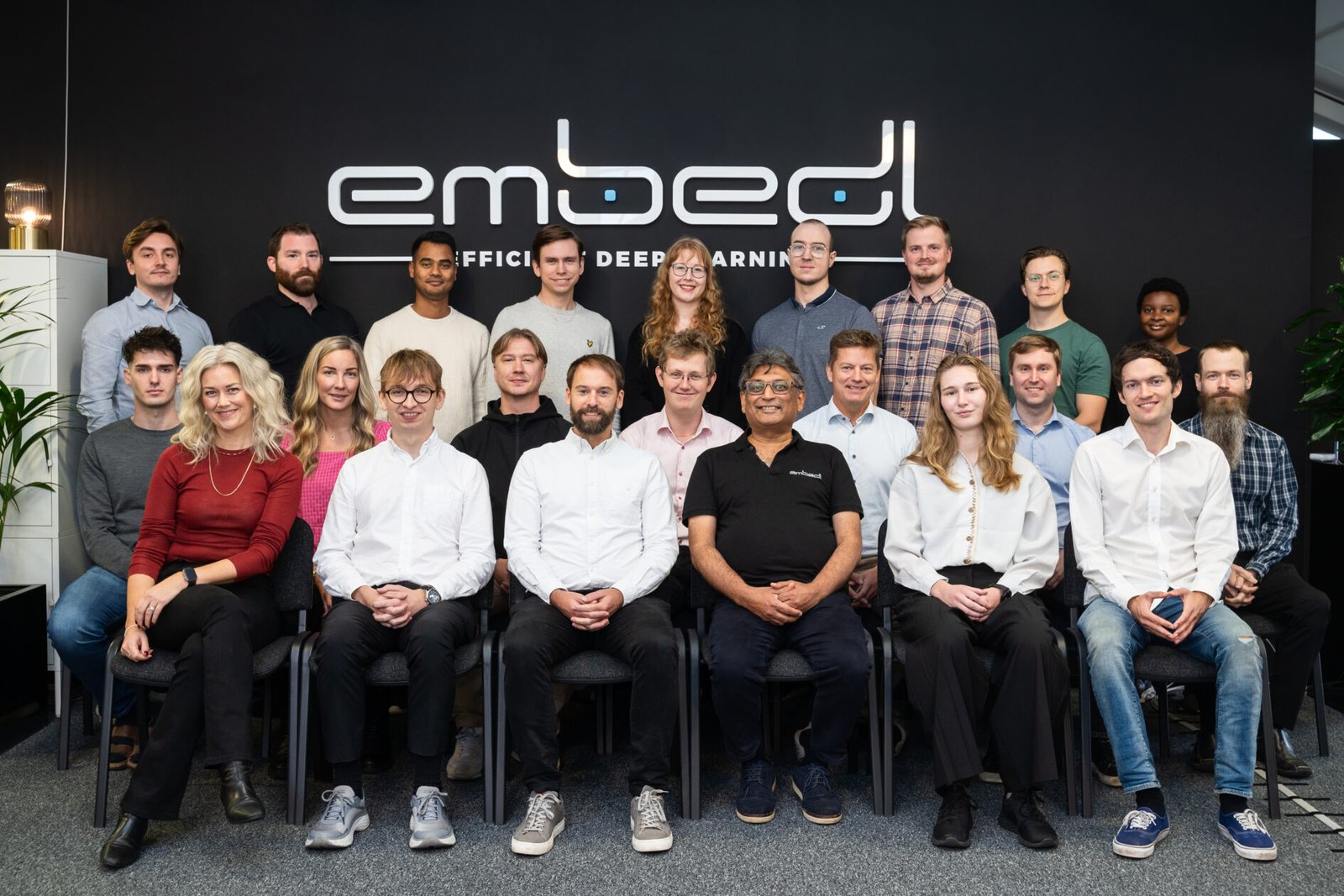The Swedish deeptech startup, a Chalmers University of Technology spinoff and Chalmers Ventures portfolio company, optimises edge-AI inference to reduce energy consumption, lower operational costs, and decrease latency Embedl’s proprietary technology has already helped large multinational companies such as Bosch, Zenseact, Tobii and Kodiak Robotics. Now, the company has raised funding to launch its new Embedl Hub platform.
GOTHENBURG, Sweden (June 18th, 2025) Swedish deeptech company Embedl has raised €5.5M in a pre-series A funding round from Chalmers Ventures, Fairpoint Capital, SEB Greentech, Spintop Ventures, and STOAF. After spinning out from Chalmers University of Technology, and kicking off commercial operations in 2022, Embedl has helped innovative startups and some of the world’s largest corporates, such as Kodiak Robotics and Bosch to optimize their products’ AI inference efficiency. With the new funding, Embedl will accelerate the commercialisation and launch of its SaaS platform, the Embedl Hub.
“The world needs to make AI more energy efficient, fast. While the applications and usage of AI continue to skyrocket, we can’t increase energy consumption at the same level. Our solution will also help bring robotics and autonomous vehicles to the market faster, as we can help optimise the hardware’s energy efficiency while assuring the highest quality data being transferred instantly. We are grateful for the new and existing investors for their support,” says Hans Salomonsson, CEO and co-founder of Embedl.
Inference of AI models surpassed AI training costs in 2024 and is still projected to continue increasing. As more and more original equipment manufacturers (OEMs) add AI features to their products, the need to run inference on low-energy and cost-efficient devices in real-time is increasing. Companies are looking for solutions that ensure their AI inference works seamlessly, even without cloud support.

Embedl’s proprietary technology enables companies from the defense, automotive, and robotics sectors to transfer their deep learning models, convolutional neural networks (CNNs), and transformer models into their hardware devices. Embedl’s technology can reduce the energy consumption up to 83%, and manufacturers can halve the cost of their hardware by optimising their models.
“Having the ability to deeply inspect the cognitive blocks of our AI models, perform hardware-aware optimization, benchmark various layers, and deploy models through seamless hardware abstraction is truly game-changing,” said Shubham Shrivastava, Head of Machine Learning at Kodiak.
For example, the defense industry relies on highly secure and efficient technologies to maintain operational superiority and readiness. The devices used need to have optimal battery life, and sensitive information cannot always be sent to the cloud for analysis.
Embedl’s Model Optimization SDK helps AI systems in defense run efficiently on existing hardware, avoiding costly upgrades. It offers tools to prune, quantise, and compress deep learning models, reducing size and speeding up inference. Its modular design lets developers tailor components for specific needs and apply their domain knowledge. Built-in visualisation tools make it easy to track model changes during optimisation.
The automotive industry has been at the forefront in developing cutting-edge safety-critical functions, which require the utilization of cost-efficient hardware. In order to remain profitable and competitive, companies are constantly seeking methods of reducing manufacturing costs. Embedl’s edge AI tools can effortlessly deploy generative AI models across multiple hardware platforms.
“This funding is a sign that Chalmers has the technical expertise to build great AI solutions. We at Chalmers Ventures are proud to continue backing our portfolio companies that deliver, and we expect great things from Embedl, in addition to the impressive achievements they have already made in such a short time,” says Jonas Bergman, Investment Director at Chalmers Ventures.
Embedl has been listed as one of the most promising startups by CB Insights’ AI100 list, NyTeknik’s 33 List, and it has won The Grand Prize for Engineering, and IVA’s Smart Industry 2024 award.
The technology is based on research by Professor Devdatt Dubashi, Data Science and AI, Computer Science and Engineering, Chalmers University of Technology.



![[CITYPNG.COM]White Google Play PlayStore Logo – 1500×1500](https://startupnews.fyi/wp-content/uploads/2025/08/CITYPNG.COMWhite-Google-Play-PlayStore-Logo-1500x1500-1-630x630.png)